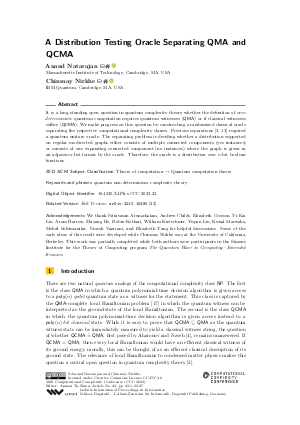A Distribution Testing Oracle Separating QMA and QCMA
Authors
Anand Natarajan  ,
Chinmay Nirkhe
,
Chinmay Nirkhe 
-
Part of:
Volume:
38th Computational Complexity Conference (CCC 2023)
Part of: Series: Leibniz International Proceedings in Informatics (LIPIcs)
Part of: Conference: Computational Complexity Conference (CCC) - License:
 Creative Commons Attribution 4.0 International license
Creative Commons Attribution 4.0 International license
- Publication Date: 2023-07-10
File

PDF
LIPIcs.CCC.2023.22.pdf
- Filesize: 0.95 MB
- 27 pages
Document Identifiers
Related Versions
- Full Version https://arxiv.org/abs/2210.15380
Subject Classification
ACM Subject Classification
- Theory of computation → Quantum computation theory
Keywords
- quantum non-determinism
- complexity theory
Metrics
- Access Statistics
-
Total Accesses (updated on a weekly basis)
0Document
0Metadata
Abstract
It is a long-standing open question in quantum complexity theory whether the definition of non-deterministic quantum computation requires quantum witnesses (QMA) or if classical witnesses suffice (QCMA). We make progress on this question by constructing a randomized classical oracle separating the respective computational complexity classes. Previous separations [Aaronson and Kuperberg, 2007; Bill Fefferman and Shelby Kimmel, 2018] required a quantum unitary oracle. The separating problem is deciding whether a distribution supported on regular un-directed graphs either consists of multiple connected components (yes instances) or consists of one expanding connected component (no instances) where the graph is given in an adjacency-list format by the oracle. Therefore, the oracle is a distribution over n-bit boolean functions.
Cite As Get BibTex
Anand Natarajan and Chinmay Nirkhe. A Distribution Testing Oracle Separating QMA and QCMA. In 38th Computational Complexity Conference (CCC 2023). Leibniz International Proceedings in Informatics (LIPIcs), Volume 264, pp. 22:1-22:27, Schloss Dagstuhl – Leibniz-Zentrum für Informatik (2023)
https://doi.org/10.4230/LIPIcs.CCC.2023.22
BibTex
@InProceedings{natarajan_et_al:LIPIcs.CCC.2023.22,
author = {Natarajan, Anand and Nirkhe, Chinmay},
title = {{A Distribution Testing Oracle Separating QMA and QCMA}},
booktitle = {38th Computational Complexity Conference (CCC 2023)},
pages = {22:1--22:27},
series = {Leibniz International Proceedings in Informatics (LIPIcs)},
ISBN = {978-3-95977-282-2},
ISSN = {1868-8969},
year = {2023},
volume = {264},
editor = {Ta-Shma, Amnon},
publisher = {Schloss Dagstuhl -- Leibniz-Zentrum f{\"u}r Informatik},
address = {Dagstuhl, Germany},
URL = {https://drops.dagstuhl.de/entities/document/10.4230/LIPIcs.CCC.2023.22},
URN = {urn:nbn:de:0030-drops-182928},
doi = {10.4230/LIPIcs.CCC.2023.22},
annote = {Keywords: quantum non-determinism, complexity theory}
}
Author Details
Acknowledgements
We thank Srinivasan Arunachalam, Andrew Childs, Elizabeth Crosson, Yi-Kai Liu, Aram Harrow, Zhiyang He, Robin Kothari, William Kretschmer, Yupan Liu, Kunal Marwaha, Mehdi Soleimanifar, Umesh Vazirani, and Elizabeth Yang for helpful discussions. Some of the early ideas of this result were developed while Chinmay Nirkhe was at the University of California, Berkeley. This work was partially completed while both authors were participants in the Simons Institute for the Theory of Computing program The Quantum Wave in Computing: Extended Reunion.
References
- Scott Aaronson. On perfect completeness for QMA. Quantum Information & Computation, 9(1):81-89, 2009. URL: https://arxiv.org/abs/0806.0450.
- Scott Aaronson. Open problems related to quantum query complexity. ACM Transactions on Quantum Computing, 2(4), December 2021. URL: https://doi.org/10.1145/3488559.
- Scott Aaronson and Greg Kuperberg. Quantum versus classical proofs and advice. In Twenty-Second Annual IEEE Conference on Computational Complexity (CCC'07), pages 115-128, 2007. URL: https://doi.org/10.1109/CCC.2007.27.
- Dorit Aharonov and Tomer Naveh. Quantum NP - A survey, 2002. URL: https://arxiv.org/abs/arXiv:quant-ph/0210077.
- Andris Ambainis. Quantum lower bounds by quantum arguments. J. Comput. Syst. Sci., 64(4):750-767, June 2002. URL: https://doi.org/10.1006/jcss.2002.1826.
-
Andris Ambainis, Andrew M. Childs, and Yi-Kai Liu. Quantum property testing for bounded-degree graphs. In Leslie Ann Goldberg, Klaus Jansen, R. Ravi, and José D. P. Rolim, editors, Approximation, Randomization, and Combinatorial Optimization. Algorithms and Techniques, pages 365-376, Berlin, Heidelberg, 2011. Springer Berlin Heidelberg.

- Anurag Anshu, Nikolas Breuckmann, and Chinmay Nirkhe. NLTS hamiltonians from good quantum codes, 2022. URL: https://arxiv.org/abs/2206.13228.
- Atul Singh Arora, Alexandru Gheorghiu, and Uttam Singh. Oracle separations of hybrid quantum-classical circuits. CoRR, 2022. URL: https://arxiv.org/abs/2201.01904.
- Charles H. Bennett, Ethan Bernstein, Gilles Brassard, and Umesh V. Vazirani. Strengths and weaknesses of quantum computing. SIAM J. Comput., 26(5):1510-1523, 1997. URL: https://doi.org/10.1137/S0097539796300933.
- Adam D. Bookatz. QMA-complete problems. CoRR, 2012. URL: https://doi.org/10.48550/arXiv.1212.6312.
-
Sergey Bravyi, David P. Divincenzo, Roberto Oliveira, and Barbara M. Terhal. The complexity of stoquastic local hamiltonian problems. Quantum Info. Comput., 8(5):361-385, May 2008.

-
Sergey Bravyi and Barbara Terhal. Complexity of stoquastic frustration-free hamiltonians. SIAM J. Comput., 39(4):1462-1485, November 2009.

- Bill Fefferman and Shelby Kimmel. Quantum vs. classical proofs and subset verification. In Igor Potapov, Paul G. Spirakis, and James Worrell, editors, 43rd International Symposium on Mathematical Foundations of Computer Science, MFCS 2018, August 27-31, 2018, Liverpool, UK, volume 117 of LIPIcs, pages 22:1-22:23. Schloss Dagstuhl - Leibniz-Zentrum für Informatik, 2018. URL: https://doi.org/10.4230/LIPIcs.MFCS.2018.22.
-
Honghao Fu. Personal Communication, October 2022.

- Sandy Irani, Anand Natarajan, Chinmay Nirkhe, Sujit Rao, and Henry Yuen. Quantum search-to-decision reductions and the state synthesis problem, 2021. URL: https://arxiv.org/abs/2111.02999.
- Stephen P Jordan, David Gosset, and Peter J Love. Quantum-merlin-arthur-complete problems for stoquastic hamiltonians and markov matrices. Physical Review. A, 81(3), March 2010. URL: https://doi.org/10.1103/PHYSREVA.81.032331.
- A.Yu. Kitaev. Fault-tolerant quantum computation by anyons. Annals of Physics, 303(1):2-30, 2003. URL: https://doi.org/10.1016/S0003-4916(02)00018-0.
-
Hartmut Klauck and Supartha Podder. Two results about quantum messages. In International Symposium on Mathematical Foundations of Computer Science, pages 445-456. Springer, 2014.

- Dexter Kozen. Lower bounds for natural proof systems. In Proceedings of the 18th Annual Symposium on Foundations of Computer Science, SFCS '77, pages 254-266, USA, 1977. IEEE Computer Society. URL: https://doi.org/10.1109/SFCS.1977.16.
-
William Kretschmer. Personal Communication, July 2022.

- Andrew Lutomirski. Component mixers and a hardness result for counterfeiting quantum money, 2011. URL: https://arxiv.org/abs/1107.0321.
- Anand Natarajan and Chinmay Nirkhe. A distribution testing oracle separation between QMA and QCMA. CoRR, 2023. URL: https://arxiv.org/abs/2210.15380.
- Chinmay Nirkhe. Lower bounds on the complexity of quantum proofs. PhD thesis, EECS Department, University of California, Berkeley, November 2022. URL: http://www2.eecs.berkeley.edu/Pubs/TechRpts/2022/EECS-2022-236.html.
- Chinmay Nirkhe. NLTS Hamiltonians from codes, 2022. Simons Institute for the Theory of Computing Quantum Colloquium. Panel Umesh Vazirani, Dorit Aharanov, Matthew Hastings, Anand Natarajan, and Chinmay Nirkhe. URL: https://simons.berkeley.edu/events/quantum-colloquium-nlts-hamiltonians-codes.
